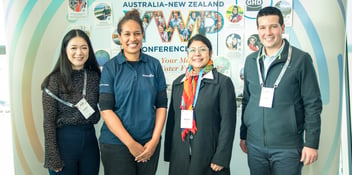Remembering Frank Bishop AM
Frank Bishop AM, one of the founding members of the Australian Water and Wastewater Association (now the Australian Water Association), has passed away aged 95. Frank had one of the longest careers in Australia's water sector, starting as an apprentice engineer at 16 and ending as a senior consultant with GHD in 2007.
Frank’s contributions to the Australian Water Association (AWA) have been enjoyed and valued by thousands of our members over 50 years. Frank was appointed as Chair of the Journal Committee in 1981 and was elected as Federal President in 1982. He was awarded Life Membership in 1987, and then the highest honour of the Association, the George Goffin Award (now called the Exceptional Service Award) in 1992.
In addition, Frank was awarded a Member of the Order of Australia (AM) with a citation “for services to water engineering, to the development of the Australian Water Association, and as a consultant, educator and administrator".
In recognition of Frank’s contribution to the Association and his dedication to mentoring of young water professionals, a scholarship was named in his honour and the ‘Frank Bishop Scholarship’ is now given to the national Young Water Professional of the Year. The scholarship provides the young water professional of the year with access to a leadership course, full registration to Ozwater and full registration to their relevant state conference.
Frank provided more than 50 years of active service to the Association. The respect Frank gained by applying his industry knowledge and coordinating technical water expertise continues to be felt right across the water sector, and he will be missed.
Australian Water Association CEO Jonathan McKeown.
When Frank retired as the chair of the AWA's Water Journal Technical Committee in 2016, we asked him to reflect on what made it all worthwhile. Here's what he had to say.
"It’s a familiar story, but I got my start in the water industry by accident. The trigger for it all was World War II, which in a way disrupted my education three times. In 1939, my family left Liverpool in the UK, sailing to Canada. From there, we travelled by train across the breadth of the continent, disembarking in Vancouver, where we boarded a ship to Hong Kong.
I was 16 years old at the time and my father found me a position as an apprentice engineer. That was the start of my career as an engineer but my time in Hong Kong was short-lived. In July 1940, all women and children were evacuated to Australia because of the likelihood of war with Japan.
False start
I started my formal engineering education in Melbourne in 1941 but, less than a year later, I was called up to serve in the Army. I ended up in what was called the Operational Research Unit, where we were tasked with testing equipment and weapons under operational conditions. We tested everything from tropical boots to flamethrowers. I served in Australia and Papua New Guinea.
After my discharge, I was able to complete my studies and in 1949, I started my civil engineering career proper.
Early on in the piece, I took what was going to be a temporary job with Scott & Furphy Group, focusing heavily on water supply and sewage. But what started as a temporary job continued for 35 years.
Water works
Our first big job overseas was the water treatment plant in Port Moresby. One of the key lessons I learned there and working on other projects overseas was the importance of respecting and accounting for different cultures and different approaches to water treatment.
The biggest consideration when planning and designing a water treatment plant in another country, whether that be in Papua New Guinea, Malaysia or China, is to allow for different cultures and to not simply assume that what would be best in an Australian context will be the best solution somewhere else.
Unfortunately, the popular thing in those days was often simply taking what was considered the best Western technology and supplying it to developing countries. There were too many instances of American technology being installed and not being accepted by the locals. It often ended up falling in a heap. Instead, it is important to be alive to differences, and supply technology that can be assimilated accordingly.
Looking back
I first got involved with what became the AWA as a member of the Institution of Engineers. I was attending a conference and there was a discussion about the need for a water-focused organisation.
I attended the first meeting in 1962 as a fairly junior person and was involved from then on, in many different roles.
I got involved because the water industry is such a vital aspect of a society but often its importance is not recognised until there is a health hazard. The community relies on the water industry and, like with the medical profession, take it for granted until a disaster occurs.
I hope talented young professionals continue to choose the water industry as a good place to launch their careers. It truly is a multi-disciplinary group, covering engineering, science, management, economics and finance, and learning to work together is vital.
One of the strengths of the water industry is its ethos of cooperation. Throughout my career, I’ve seen people come to the aid of their fellow professionals time and time again. A lot of valuable information gets readily passed around to other bodies, and not kept as secret or protected.
It hasn’t just been hard work. We managed to have quite a lot of fun too."


